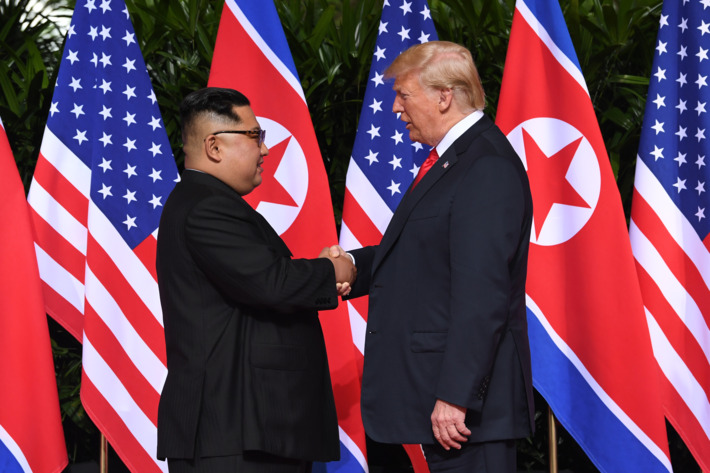- Trump Signs ‘Comprehensive Document’ With Kim as Summit Ends
U.S. President Donald Trump signed what he called a “very comprehensive” document with North Korean Leader Kim Jong Un, capping a highly anticipated summit in Singapore aimed at overcoming decades of hostility and mistrust.
“We both want to do something,” Trump said on Tuesday, with Kim sitting at his side, later promising the two would meet again. “We both are going to do something. We’ve developed a very special bond.”
The North Korea leader said through a translator that the document “heralds a new start, leaving the past behind.” He added: “the world will witness a major change now.”
Neither Trump nor Kim gave any indication about the contents of the document, though the president said he would elaborate for the media later Tuesday. The signing ceremony came more than four hours into a meeting in Singapore aimed at easing decades of tensions between adversaries that only last year seemed on the brink of nuclear war.
Trump said that he and Kim would be meeting again, though he offered no timeline for when that might happen.
“Our whole relationship with North Korea and the Korean Peninsula is going to a very much different situation than it has in the past.”
For each leader, the summit represented a major gamble, and the outcome will be dissected around the globe for a sense of whether one of the world’s greatest security threats — Kim’s nuclear arsenal — can be eliminated. The talks were seen as a key first step to a formal end of the Korean War, which remains unfinished after a 1953 armistice.
The two men kicked off their summit with a handshake shortly after 9 a.m. local time Tuesday — 9 p.m. Monday in New York — marking the first face-to-face encounter between a sitting U.S. president and a North Korean leader.
As the meeting opened at the Capella Hotel on Singapore’s Sentosa Island, the two men entered with somber expressions that quickly gave way to smiles. Moments earlier, Trump had announced his chief economic adviser, Larry Kudlow, had been sent to the hospital after suffering a heart attack.
“It’s my honor, and we will have a terrific relationship, I have no doubt,” Trump said in brief remarks to reporters moments after their history-making handshake.
“It was not an easy journey,” Kim said earlier. “We’ve had a past that stopped us from advancing, and wrong behaviors and practices sometimes closed our eyes and ears, but we’ve overcome those to come to this point.”
The two leaders emerged about three hours into their meetings after a working lunch with senior aides. Trump spoke briefly to the press, letting reporters know that there would be a document signing, then appeared to show Kim his armored presidential limousine.
“It’s going great,” Trump said, with Kim at his side. “We had a really fantastic meeting. A lot of progress. Really very positive, I think better than anybody could’ve expected. Top of the line. Really good.”
Trump was joined in the talks by Secretary of State Mike Pompeo, who played a crucial role setting up the summit, National Security Adviser John Bolton and Chief of Staff John Kelly. Kim was accompanied by North Korean Vice Chairman Kim Yong Chol, Foreign Minister Ri Yong Ho and former Foreign Minister Ri Su Yong.
Just meeting with Trump marks a diplomatic accomplishment for Kim, who has emerged from isolation in recent months and rapidly increased his outreach to other world leaders.
By sitting down with an American president — a longtime goal of North Korea’s government — Kim’s regime is advancing its effort to establish its “reputation, respect, and credibility as a nuclear weapon state,” said Michael J. Green, senior vice president for Asia and Japan Chair at the Center for Strategic and International Studies.
Drama surrounding the event heightened in the hours before the leaders greeted each other, as the two sides shifted their schedules. After Kim made clear that he would be leaving Singapore by the end of the day, the White House announced that Trump would depart in the evening after delivering his afternoon news conference.
Trump wants the complete, verifiable and irreversible dismantling of North Korea’s nuclear weapons program. Kim is seeking a security guarantee — and possibly a peace treaty — and the removal of the U.S.’s nuclear umbrella protecting allies South Korea and Japan.
Kim has rejected calls to unilaterally give up his weapons in return for economic aid, and instead has proposed a step-by-step denuclearization process. His public statements and state-run media indicate he wants a deal to ease sanctions, but that he won’t give up his nuclear weapons until he feels safe enough to retain power without them.
Pompeo on Monday drew a firm line, saying the U.S. plans to keep sanctions in place until North Korea eliminates its nuclear weapons capability. Complete, verifiable, irreversible denuclearization, he told reporters, “is the only outcome that the United States will accept.”
Yet the top U.S. diplomat added Trump is ready to offer “unique” guarantees to ease the regime’s concerns about giving up a nuclear arsenal that provides a deterrent against foreign adversaries while also serving as a key point of national pride.


 Naira4 weeks ago
Naira4 weeks ago
 Naira3 weeks ago
Naira3 weeks ago


 Naira4 weeks ago
Naira4 weeks ago




 Naira3 weeks ago
Naira3 weeks ago
 Commodities4 weeks ago
Commodities4 weeks ago


 Sport Business4 weeks ago
Sport Business4 weeks ago


 News3 weeks ago
News3 weeks ago


 Banking Sector4 weeks ago
Banking Sector4 weeks ago























